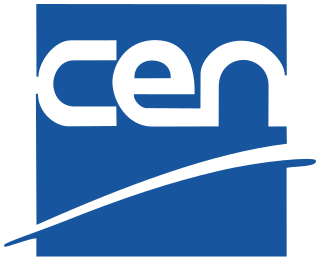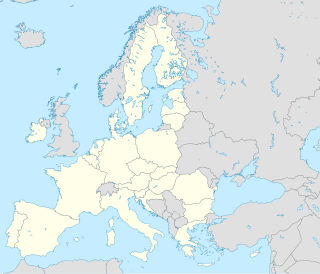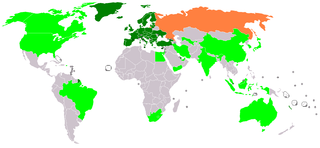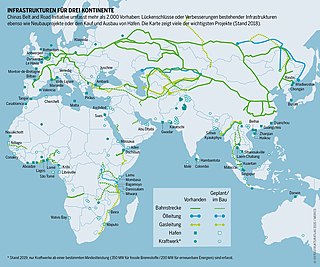Interoperability is a characteristic of a product or system, whose interfaces are completely understood, to work with other products or systems, at present or in the future, in either implementation or access, without any restrictions. While the term was initially defined for information technology or systems engineering services to allow for information exchange, a broader definition takes into account social, political, and organizational factors that impact system-to-system performance. Hence, interoperability involves the task of building coherent services for users when the individual components are technically different and managed by different organizations. Types of interoperability include syntactic interoperability, where two systems can communicate with each other, and cross-domain interoperability, where multiple organizations work together and exchange information. In any collaborative effort, cross-domain interoperability is important because a lack of communication can cause misunderstandings and greatly reduce efficiency. This would especially be a problem in organizations that are meant to respond to emergencies as quickly as possible, such as law enforcement, fire fighting, EMS, and other public health and safety departments.

Roaming is a wireless telecommunication term typically used with mobile devices, such as mobile phones. It refers to a mobile phone being used outside the range of its native network and connecting to another available cell network.

The Free Software Foundation Europe (FSFE) is an eingetragener Verein under German law founded in 2001 to support all aspects of the free software movement in Europe, with registered chapters in several European countries. It is the European sister organization of the US-based Free Software Foundation (FSF). FSF and FSFE are financially and legally separate entities.

The European Committee for Standardization is a public standards organization whose mission is to foster the economy of the European Single Market and the wider European continent in global trading, the welfare of European citizens and the environment by providing an efficient infrastructure to interested parties for the development, maintenance and distribution of coherent sets of standards and specifications.

The European Agency for Safety and Health at Work (EU-OSHA) is a decentralised agency of the European Union with the task of collecting, analysing and disseminating relevant information that can serve the needs of people involved in safety and health at work. Set up in 1994 by Council Regulation (EC) No 2062/94 of 18 July 1994, EU-OSHA is based in Bilbao, Spain, where it has a staff of occupational safety and health, communication and administrative specialists. Dr Christa Sedlatschek is the current Director of EU-OSHA, following on from Dr Jukka Takala in September 2011.

The European Trade Union Confederation (ETUC) is the major trade union organisation representing workers at the European level. European integration has reinforced the EU's role in economic, employment and social policy throughout the 27 member states. The ETUC is a European social partner, which means that the European Commission consults it when developing social and economic policies. It also negotiates autonomous agreements and work programmes with European employers. And it coordinates the national and sectoral policies of its affiliates on social and economic matters, particularly in the framework of the EU institutional processes, including European economic governance and the EU Semester.

Cold calling is the solicitation of business from potential customers who have had no prior contact with the salesperson conducting the call. It is an attempt to convince potential customers to purchase either the salesperson's product or service. Generally, it is referred as an over-the-phone process, making it a source of telemarketing, but can also be done in-person by door-to-door salespeople. Though cold calling can be used as a legitimate business tool, scammers can use cold calling as well.
The Framework Programmes for Research and Technological Development, also called Framework Programmes or abbreviated FP1 to FP9, are funding programmes created by the European Union/European Commission to support and foster research in the European Research Area (ERA). Starting in 2014, the funding programmes were named Horizon.
EPAS is a non-commercial cooperation initiative launched in Europe which aims at developing a series of data protocols to be applied in a point of interaction (POI) environment.
The Swiss Mutual Fund, also known as Swiss Cash or Swisscash, is an offshore investment company headquartered in the Commonwealth of Dominica. It involved in operating an Internet-based investment scheme which offers returns of up to 300% within 15 months of investment and has been identified as one of the Ponzi schemes taking place in 2000s.

The International Trade Centre (ITC) is a multilateral agency which has a joint mandate with the World Trade Organization (WTO) and the United Nations (UN) through the United Nations Conference on Trade and Development (UNCTAD).
The European Committee for Interoperable Systems (ECIS) is an international non-profit association founded in 1989 in order to promote interoperability and market conditions in the Information and Communications Technology (ICT) sector allowing vigorous competition on the merits and a diversity of consumer choice. ECIS has represented its members on many issues related to interoperability and competition before European, national and international bodies, including the European Union institutions and the World Intellectual Property Organization (WIPO). ECIS members include large and smaller information and communications technology hardware and software providers as Adobe Systems, Corel Corporation, IBM, Linspire, Nokia, Opera Software, Oracle Corporation, RealNetworks, Red Hat, and Sun Microsystems.

OpenForum Europe (OFE) is a European open source software and open standard not-for-profit organisation advocating for interoperability in technology. Its key objective is to contribute to achieve an open and competitive Digital ecosystem in Europe.

ETSI is an independent, not-for-profit, standardization organization in the field of information and communications. ETSI supports the development and testing of global technical standards for ICT-enabled systems, applications and services.
The Single European Railway Directive 20122012/34/EU is an EU Directive that regulates railway networks in EU law. This recast the "First Railway Directive" or "Package" from 1991, and allows open access operations on railway lines by companies other than those that own the rail infrastructure. The legislation was extended by further directives to include cross border transit of freight.

Qnet Ltd, formerly known as QuestNet, GoldQuest, and QI Limited, is a Hong Kong-based multi-level marketing (MLM) company owned by the QI Group. The company's products include energy, weight management, nutrition, personal care, home care and fashion accessories on an e-commerce platform.

Joinup is a collaboration platform created by the European Commission. It is funded by the European Union via its Interoperability Solutions for Public Administrations Programme.
The European American Chamber of Commerce (EACC) is a private, independent, non-political, 501(c)(6) nonprofit organization whose objective is to promote and stimulate transatlantic business development between Europe and the United States. The EACC fosters economic development by providing its members with information, resources, and support on matters relating to business activities between Europe and the United States. There are currently seven chapters located in Europe and the United States.

The Belt and Road Initiative, formerly known as One Belt One Road or OBOR for short, is a global infrastructure development strategy adopted by the Chinese government in 2013 to invest in nearly 70 countries and international organizations. It is considered a centerpiece of the Chinese leader Xi Jinping's foreign policy. The BRI forms a central component of Xi Jinping's "Major Country Diplomacy" strategy, which calls for China to assume a greater leadership role for global affairs in accordance with its rising power and status.
The once-only principle is an e-government concept that aims to ensure that citizens, institutions, and companies only have to provide certain standard information to the authorities and administrations once. By incorporating data protection regulations and the explicit consent of the users, the public administration is allowed to re-use and exchange the data with each other. The once-only principle is part of the European Union's (EU) plans to further develop the Digital Single Market by reducing the administrative burden on citizens and businesses.











